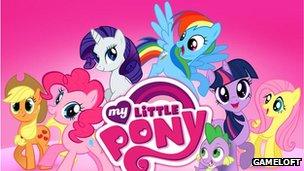My Little Pony mobile phone game in-app payment row
- Published

The game is 'freemium' - which is different from free
Complaints have prompted mobile phone game developer Gameloft to reduce the cost of playing My Little Pony: Friendship is Magic.
The "freemium" game is free to play or gamers can pay to progress faster. But some players say it can take years to finish without spending cash.
Campaigners worry about the number of such freemium games aimed at children.
But Gameloft said the complaints were from older users known as "bronies", not from children or their parents.
A "brony" is the term used to describe the adult fans of the My Little Pony game and of the TV show of the same title.
The game can be downloaded free from Apple's App store or the Android equivalent, Google Play.
It involves building and managing the town of Ponyville. Despite being free, players have the option to pay to progress faster, using the game's premium currency, gems.
'Frustrated' users
The last pony, needed to finish the game, used to cost 500 gems - the equivalent of £34 ($44) - and some users complained on forums that it was extremely difficult and took too long to get the amount of gems required without paying.
"Looking at the ponies it seems it would take over 100 dollars in cash to unlock everything, which seems utterly ridiculous," said one player, pinkuchuu, on a web forum., external
The complaints were first described in an article on technology blog CNET, external, which was then approached by Gameloft.
Lewis Digby from Gameloft's UK branch told the BBC the company responded to comments of "a selected few hardcore older fans of My Little Pony who were wanting to progress through the game very quickly".
Free or freemium?
He said the company dropped the price for the most expensive pony, Rainbow Dash, from 500 gems to 50 gems (£5, $8).
But he added that the My Little Pony: Friendship is Magic game had had excellent feedback from its main audience, young girls.
"People confuse free games and freemium," he said.
"We are not creating free games here, these are games with a free access, but we have to sell in-game content if we want to be profitable.
"But you can enjoy our games for free - it's about giving our customers the option. It's up to them to decide if they want to play more regularly and progress through the game quicker. They can pay for in-game content, but you can enjoy it very much without paying anything."
Marc Gander of the Consumer Action Group said that it was not uncommon to see costs pop up in mobile games for children that parents at first thought were free.
"I think that any parent who is suddenly faced with having to say 'No' to their child or else foot the bill for what they thought was a free game would be justified in feeling that they had been mugged," he said.
Earlier this year, Apple was sued by parents over another freemium app, Smurfs' Village, arguing that it was too easy to rack up huge bills on iPhones without parents' consent. The case is still active.
- Published14 May 2012
- Published11 August 2010